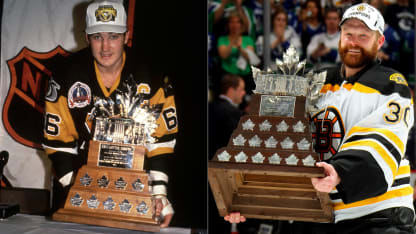The Conn Smythe Trophy turns 55 today. First awarded on May 1, 1965, to honor the most valuable player of the Stanley Cup Playoffs, the trophy is named after Conn Smythe, a coach, general manager and owner of the Toronto Maple Leafs. It was first presented to Montreal Canadiens center Jean Beliveau and has been won by 47 different players among the 54 times it has been awarded, most recently by St. Louis Blues center Ryan O'Reilly in 2019.
Top Conn Smythe Trophy winners debated by NHL.com
Writers weigh in on performances by playoff MVPs on 55th anniversary of award

© Getty Images


















